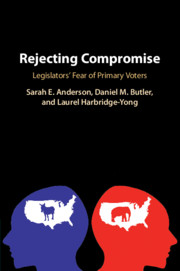Book contents
- Rejecting Compromise
- Rejecting Compromise
- Copyright page
- Contents
- Figures
- Tables
- Acknowledgments
- 1 Rejecting Compromise, Getting Gridlock
- 2 Legislators Reject Half-Loaf Compromises
- 3 Legislators Reject Half-Loaf Compromises Because They Fear Voter Retribution
- 4 Primary Voters as the Source of Punishment
- 5 Voter Punishment Is Rare but Real
- 6 Structuring Negotiations in the Shadow of Primary Voter Punishment
- 7 Compromise, Voter Punishment in Primaries, and Legislative Gridlock
- References
- Index
7 - Compromise, Voter Punishment in Primaries, and Legislative Gridlock
Published online by Cambridge University Press: 28 January 2020
- Rejecting Compromise
- Rejecting Compromise
- Copyright page
- Contents
- Figures
- Tables
- Acknowledgments
- 1 Rejecting Compromise, Getting Gridlock
- 2 Legislators Reject Half-Loaf Compromises
- 3 Legislators Reject Half-Loaf Compromises Because They Fear Voter Retribution
- 4 Primary Voters as the Source of Punishment
- 5 Voter Punishment Is Rare but Real
- 6 Structuring Negotiations in the Shadow of Primary Voter Punishment
- 7 Compromise, Voter Punishment in Primaries, and Legislative Gridlock
- References
- Index
Summary
Chapter 7 discusses how to balance representation and accountability with processes that might better insulate legislators from their electoral fear as they seek to negotiate compromises. Ensuring that the public is knowledgeable about elected officials’ decisions is an important facet of democratic accountability. Yet the watchful eye of primary voters may also deter legislators from considering reasonable compromises. Chapter 7 discusses how to balance these two considerations and discusses whether communication with constituents can facilitate compromise. Our findings, as well as the comments from state legislators at the 2017 NCSL Summit, emphasize the importance of communication between legislators and their constituents – explaining the legislative process, justifying choices, and developing a home style that cultivates trust. With greater communication and building of trust, legislators may have leeway to insulate portions of the legislative process from public scrutiny, helping them reach compromises and overcome gridlock to solve pressing problems.
- Type
- Chapter
- Information
- Rejecting CompromiseLegislators' Fear of Primary Voters, pp. 129 - 146Publisher: Cambridge University PressPrint publication year: 2020



